Civil Liberties, Human Rights, Surveillance, Truth to Power, War Resister
Podcast: Play in new window | Download
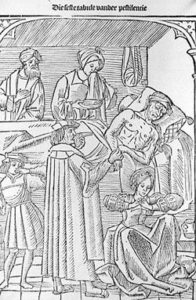
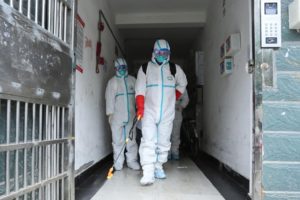
COVID-19 Virus And History of Quarantine
“Quarantine” is a state, period, or place of isolation in which people or animals that have arrived from elsewhere or who have been exposed to infectious or contagious disease are placed.
As Law & Disorder taped this show in early March 2020, thousands of people around the globe are being quarantined as governments rush to keep the COVID-19 virus from spreading. In China, for example, thousands were forced into mass quarantine centers. And entire cities and towns in Italy were put on lock-down, sending an estimated 100,000 persons into quarantine.
In the United States, quarantines are being readied for some first responders. Two dozen emergency workers are being monitored for possible exposure to the coronavirus. And 27 firefighters and two police officers were quarantined in Washington State.
Today on Law and Disorder we’ll examine the civil liberties aspects of quarantines and other government responses to pandemics.
The word quarantine, and the practice, dates back to the Middle Ages. It was first used in English in 1617 to refer to the 40 days a ship suspected of carrying a contagious disease was detained offshore in isolation.
But the first instance of the institutionalized practice of quarantine actually occurred in the 14th century when the Bubonic plague, also referred to as Black Death, devastated Europe from 1347 to 1352, killing approximately 20 million people.
Authorities in Venice were the first to formalize the protective action after the plague began spreading there in 1347. Ports were closed to ships and travelers who had to spend 40 days in isolation.
In the early days of the United States local and state jurisdictions were responsible for protection against contagious diseases. After a 1793 yellow fever epidemic struck Philadelphia and killed 5,000, the city created a 10-acre quarantine station called the Lazaretto along the Delaware River.
With outbreaks of yellow fever, Congress passed the National Quarantine Act in 1878 marking the federal governments involvement with quarantine activities. The quarantine system was fully nationalized by 1921, according to the CDC.
Guest – Professor Wendy Parmet from Northeastern Law School is a leading expert on health, disability and public health law and directs the law school’s Center for Health Policy and Law and its JD/MPH programs. She holds a joint appointment with Northeastern’s School of Public Policy and Urban Affairs in recognition of her national leadership in interdisciplinary thinking and problem solving on health care issues. Wendy co-edits the law school’s SSRN online publications, Human Rights and the Global Economy and the Northeastern University School of Law Public Law and Legal Theory Paper Series. In 2016, Wendy was honored with the prestigious Jay Healey Health Law Teachers Award by the American Society of Law, Medicine & Ethics.
—-
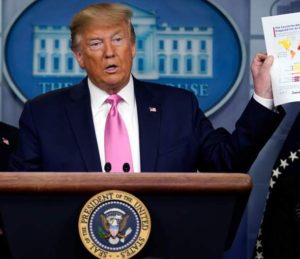
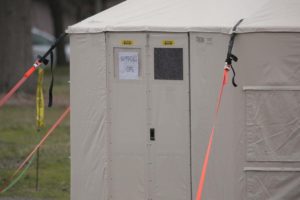
COVID-19: Public Health Experts Urge US Government To Ensure Scientifically Based Response Plan
A group of more than 450 public health experts recently urged government leaders to enact scientifically-informed policies to mitigate the effects of the Covid-19 coronavirus in the U.S. They called for fair and equitable imposition of such policies.
According to the ACLU, the experts’ recommendations, sent in a public letter, will help ensure a response plan that protects the health, safety, and civil liberties of all. It’s generally accepted that during a disease outbreak, individual rights may have to cede to give way to the greater good. But that is only if science supports the need for such measures, which may include isolation and quarantine.
In their letter, the public health experts ask officials, for example, to work with insurance companies to ensure that lack of insurance and high costs are not a barrier to testing and treatment. They call for health care facilities to be dubbed “immigration enforcement-free zones” — a step used before during hurricanes and other emergencies. And they seek extra help for under-resourced hospitals and community health centers.
Also impacted are minimum-wage workers and others who live on the economic margins, can’t telecommute, and can’t afford to lose their jobs. The experts also stress that leaders need to scrupulously ensure that their public messages are accurate and guided by science and not politics. In the past many responses to emergencies have been hindered by politics, including China’s response to the SARS coronavirus outbreak in 2003.
Guest – Jay Stanley, Senior Policy Analyst at the ACLU’s Speech, Privacy, and Technology Project at the ACLU in Washington, DC.
——————————

——————————
Censorship, CIA Sponsored Terror, Civil Liberties, Habeas Corpus, Human Rights, Iraq War, NSA Spying, Political Prisoner, Supreme Court, Surveillance, Truth to Power, Uncategorized, War Resister
Podcast: Play in new window | Download

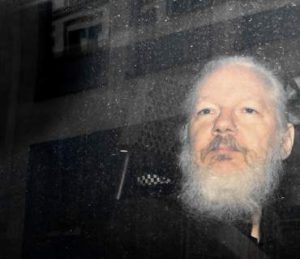
In Defense Of Julian Assange: Attorney Renata Avila
We continue our ongoing coverage of Wikileaks founder Julian Assange, who remains in confinement at London’s high-security Belmarsh prison. Julian is fighting extradition to the United States on 18 charges, including violating the Espionage Act and conspiring to hack government computers. As listeners will recall, the charges are in connection with Wikileaks’ release of thousands of secret cables in 2010.
Guest – Renata Avila, a member of the Julian Assange legal team. Renata is an international Human Rights lawyer from Guatemala, specializing in preserving human rights during the next wave of tech challenges. She is a Board member for Creative Commons, the Common Action Forum and is a Global Trustee of the Think Tank Digital Future Society. She is also a member of the WEF’s Global Future Council on Human Rights and Technology and a Steering Committee Member of the Information Society Advisory Council for the Organization for Economic Co-operation and Development.
—-
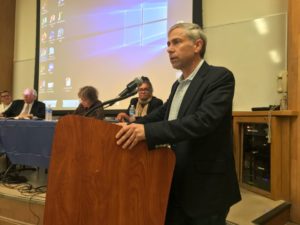
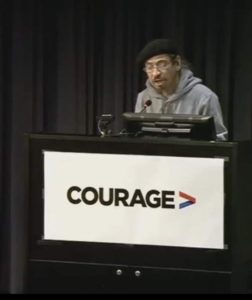
The Prosecution of Julian Assange – CUNY School of Law and UCLA
We listen to two presentations from a panel discussion among leading journalists, attorneys and human rights defenders as the extradition trial in London of WikiLeaks founder Julian Assange is set to begin.
The first speaker is lead attorney Barry Pollack representing Julian Assange speaking at The Prosecution of Julian Assange forum at UCLA.
We then hear from Glen Ford speaking at the CUNY School of Law, Glen is the Executive editor, Black Agenda Report. He’s a broadcast, print and web pioneer and founding member of the Washington chapter of the National Association of Black Journalists.
————————————

————————————
CIA Sponsored Terror, Civil Liberties, Habeas Corpus, Human Rights, Surveillance, Truth to Power
Podcast: Play in new window | Download
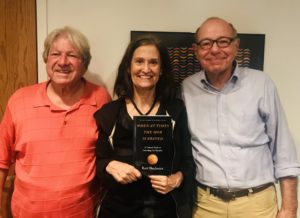
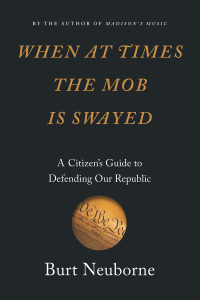
When at Times the Mob Is Swayed, A Citizen’s Guide to Defending Our Republic
Trump was elected by about 25% of the eligible voters. Half of the voters who could have, didn’t vote. He lost the popular election by 3 million votes. Since then, this appalling man has proceeded to aggrandize his power. Backed by large corporations to whom he gave huge tax breaks and for whom he cut regulations, the military to which he just gave a $750 billion budget, a Republican Supreme Court and the right wing media such as Sinclair Broadcasting and Fox News he has maintained a steady base of support in the population.
Increasing a sense of dread has spread across our country, it appears possible that Trump may get reelected. Democracy and the rule of law are increasingly threatened.
Guest – Constitutional Lawyer, Burt Neuborne is the former legal director of the American Civil Liberties Union and has argued many cases before the US Supreme Court. Attorney Neuborne’s book “When at Times the Mob is Swayed” has been recently published by the New Press. He is currently the Norman Dorsen Professor of Civil Liberties at NYU School of Law.
—-
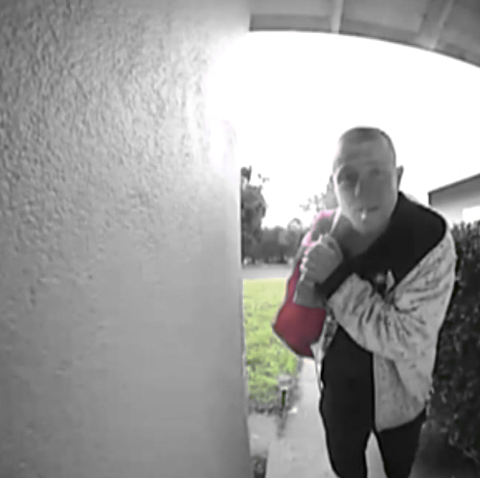
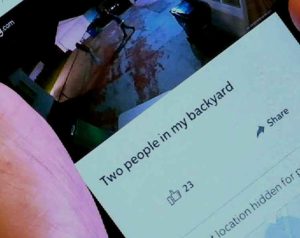
Amazon Ring Of Surveillance
When it comes to e-commerce, the multinational tech company Amazon.com has laid claim to a huge corner on the market. Now, it’s venturing into the business of surveillance.
Amazon is aggressively pursuing law enforcement partnerships. More than 400 police departments across the nation have already joined forces with the tech giant’s so-called smart doorbell program, called Ring. Part of Amazon’s outreach strategy in gaining new police partners is to play on fears of increasing property crime.
Ring doesn’t just show you who is at your door. It films and records any interaction or movement at owners’ doors, then alerts users’ phones. With partnerships between mega corporations and law enforcement to use new surveillance systems in the public–leaving out community input–come a host of civil liberties concerns, including racial profiling.
Guest – Matthew Guariglia of the Electronic Frontier Foundation. Matthew is a policy analyst working on issues of surveillance and privacy at the local, state, and federal level. He is a frequent contributor to the Freedom of Information-centered outlet Muckrock and his bylines have appeared in the Washington Post and Motherboard.
——————————–

——————————–
CIA Sponsored Terror, Civil Liberties, Human Rights, Political Prisoner, Supreme Court, Surveillance, Truth to Power
Podcast: Play in new window | Download
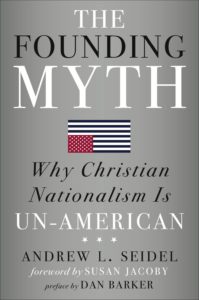

The Founding Myth: Why Christian Nationalism is Un-American
The men who wrote United States Constitution and the first Ten Amendments to it known as the Bill of Rights were mostly not Christians. America was not created as a Christian country. That is a myth. Nor was it founded on Judeo Christian principles. This is another myth. The founding fathers were deists. They were products of the enlightenment. They did not believe in a god that played any role in human affairs. They understood from European history the terrible consequences of not separating church and state.
Today’s Christian nationalists, evangelicals who are in truth white nationalists, are relentless in their attempts to tear down the wall of separation between church and state guaranteed by the first amendment. They want a theocracy where their fundamentalist religion rule us. These people have substantial political power. They are much of Trump’s base.
Guest – Attorney Andrew Seidel, a Constitutional litigator with the Freedom From Religion Foundation and the author of the just published book The Founding Myth: Why Christian Nationalism is Un-American.
—-
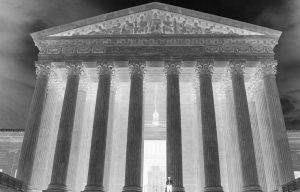
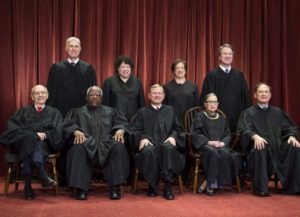
United States Supreme Court Cases Roundup
The Supreme Court is poised to hear several highly charged disputes as the justices return to the bench in 2020. It promises to be one of the most politically volatile terms in recent memory.
Since October, when the term opened, the court has heard high-profile disputes over LGBT rights in the workplace, the scope of the Second Amendment, and the deportation status of nearly 700,000 young undocumented immigrants.
The remaining cases on the court’s docket are equally explosive. The justices will confront novel separation of powers questions, including whether to release to investigators the financial records of Donald Trump. The Court will be asked to draw new lines between church and state. And for the first time since Trump’s two nominees joined the court, the justices will hear a case on abortion. profvwolfe.com
Guest – Attorney Zachary Wolfe teaches writing at George Washington University in Washington D.C., before which he worked at the Partnership for Civil Justice Fund. Zak is the editor of Farnsworth on Contracts and author of Hate Crimes Law.
————————-

————————-
CIA Sponsored Terror, Civil Liberties, Criminalizing Dissent, Cuba, Guantanamo, Habeas Corpus, Human Rights, Political Prisoner, Prison Industry, Surveillance, Truth to Power
Podcast: Play in new window | Download
- Michael Smith and Guest Host Natasha Bannan Discuss 61st Anniversary of Cuban Revolution
—-
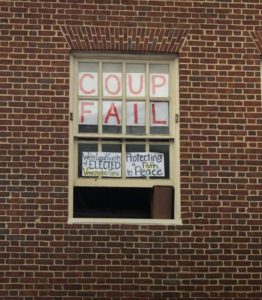
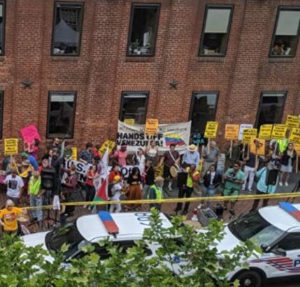
Venezuelan Embassy Protectors Could Face Fines And Prison
The first week of January 2020 marks the 61st anniversary of the Cuban revolution. The Cuban people now have some of the best healthcare in the world, free education through college, adequate housing, and a high-level of culture.
The attitude of the American government has been one of almost unrelieved hostility including violence and an ongoing economic, financial, and commercial blockade.
Unable to reverse the Cuban revolution United States sought from the beginning to contain its influence. From the 1960s the governments of Chile, Argentina, Bolivia, Brazil, the Dominican Republic, Uruguay and recently Bolivia were overthrown by American sponsored coups because of their friendly position towards Cuba. As of today the Venezuelan government is being targeted by the United States.
In violation of international law in May of 2019, the United States government attempted but failed to overthrow the democratically elected government of Nicolas Madura in Venezuela.
The United States had at that time attempted to install Juan Guida as the president of Venezuela and Guida’s right wing supporters attempted to take over the Venezuelan embassy in Washington DC. Under international law, the embassy is the property of Venezuelan government and is considered untouchable.
A number of Americans, known as the Embassy Protectors, moved in to the embassy to prevent its hostile takeover. The State Department, Secret Service, and the Metropolitan Police force laid seize to the embassy. Electricity and water were cut off. No food was allowed in.
Although the coup against the Maduro government failed the Embassy Protectors were arrested when the US government raided the Venezuelan embassy. Four of the protectors including today’s Law And Disorder guest Attorney Kevin Zeese were arrested and face trial. If convicted they could be fined up to $250,000 and given a one year prison term. Embassy Protectors
Guest – Kevin Zeese is a US lawyer and political activist. He helped organize the 2011 Occupy encampment in Washington DC. Kevin Zeese is currently the co-director of The Organization Popular Resistance.
—-


U.S. Anti-Immigration and Just Futures Law
Anti-immigrant discourse and policy has defined a large part of the Trump Administration since 2016. We take a look into attacks against immigrants in the United States and related rule making in the last few months.
Guest – Paromita Shah is the Executive Director of Just Futures Law, a new movement lawyering organization dedicated to ending the deportation and mass incarceration industrial complexes. Paromita has spent over 20 years in providing innovative legal and advocacy support to lawyers and legal advocates, grassroots groups and organizers, in the fight against criminalization and immigration enforcement. She has worked to support immigrant communities impacted by policing and immigration enforcement and has worked on issues like immigration detainers, gangs, and technology surveillance.
———————————

———————————
CIA Sponsored Terror, Civil Liberties, Human Rights, NSA Spying, Political Prisoner, Prison Industry, Supreme Court, Surveillance, Targeting Muslims, Truth to Power, War Resister
Podcast: Play in new window | Download
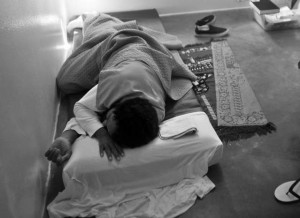
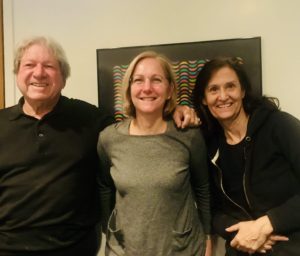
CCR Attorney Brings GTMO Cases To Highest International Court
The International Criminal Court was established in 1998 and began sitting in 2002. To date there are 123 countries who have ratified the Rome Statute that created the ICC and participate in it.
The role of the ICC is to bring to justice the world’s worst crimes known to humankind – war crimes, crimes against humanity, and genocide. The United States of America is not one of the 123 countries who participate in this International Court. But it can still be investigated and tried if the crimes it commits were committed in one of the 123 countries.
Guest – Attorney Katherine Gallagher, senior attorney at The Center for Constitutional Rights will be appearing before the ICC in the Hague in Holland on December 4, 2019. Attorney Gallagher will be representing two men currently being held and indefinitely detained in the US offshore prison camp in Guantánamo Cuba. Katherine works on universal jurisdiction and international criminal law cases involving U.S. and foreign officials and torture and other war crimes, and cases involving private military corporations and torture at Abu Ghraib. Her major cases include Al Shimari v. CACI, the international U.S. torture accountability cases, and Survivors Network of those Abused by Priests (SNAP) v. Vatican, seeking accountability for the crimes against humanity of sexual violence by clergy and cover-up.
—-
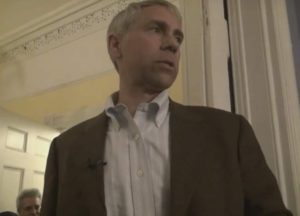
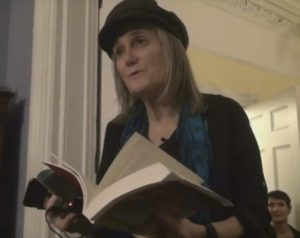
In Defense of Julian Assange Book Launch
Margaret Kunstler, Aaron Mate, Nathan Fuller, Amy Goodman, and Barry Pollack spoke about the wrongly prosecuted Julian Assange on the occasion of the recent publication by OR Books of In Defense of Julian Assange composed of 39 authors offering a range of insights and perspectives. The event on November 21, 2019 took place at the home of the late Michael Ratner, Assange’s former attorney. We hear from Margaret Kunstler, Barry Pollack, Nathan Fuller and Amy Goodman.
——————————

——————————
























